VietnamPlus Electronic Newspaper respectfully introduces the content of the article "Global turning point in the fight against cybercrime and Vietnam's pioneering role" by Dr. Vu Hai Quang, Deputy General Director of Voice of Vietnam .
The world is facing an unprecedented cyber security crisis. The damage caused by cybercrime is predicted to reach 10.5 trillion USD by the end of 2025, equivalent to the size of the economies of the top countries in the world. Cybercrime is exploding in both scale and sophistication, directly threatening the economy, social stability and security of every country.
In that context, Vietnam will host the signing ceremony of the United Nations Convention against Cybercrime on October 25-26, 2025 in Hanoi , a historic event demonstrating the international community's determination to join hands in building a legal framework to protect a safe digital space.
For the first time, the name of the capital Hanoi is associated with a global multilateral treaty on cyber security, marking an important milestone in Vietnam's multilateral foreign affairs history, while affirming Vietnam's pioneering role in efforts to create a legal order for the digital age.
Global cybercrime storm
Cybercrime today is not just about wallets or data, but also about strategic disruption and destruction of society’s critical physical infrastructure. To understand the extent of the danger, we can imagine a “storm” of digital crime sweeping the globe, created by the convergence of three main factors below:
Technological advancements “aid” cybercrime: The rapid development of technology has become a double-edged sword for cybersecurity. On the one hand, artificial intelligence (AI) and new technologies support defense teams, for example, AI systems that automatically detect and analyze malware; but on the other hand, they also give hackers unprecedented dangerous tools.
Dr. Vu Hai Quang, Deputy General Director of Voice of Vietnam.
The year 2025 will see AI being widely applied, allowing hackers to create self-mutating malware to bypass traditional defense systems. More dangerously, cybercriminals will also take advantage of large language models (LLM) and deepfake technology (fake images, voices) to carry out extremely sophisticated non-technical attacks. They can impersonate leaders, officials, partners or relatives to defraud and appropriate assets; even use deepfake to bypass biometric security measures. These tricks make it almost impossible for ordinary users to protect themselves, forcing the defense burden to fall on the shoulders of security systems managed by the Government and businesses.
Professionalized cybercrime syndicates: Unlike the previous image of individual hackers, many cybercrime organizations now operate as underground technology corporations and businesses.
Typically, ransomware gangs operate under the “Crime-as-a-Service” model, willing to sell attack tools and services to anyone who pays. They are organized as professionally as legitimate companies.
For example, the Interlock group developed a disguised “FileFix” tool to bypass antivirus software; and the Qilin group even integrated automated negotiation systems and invoked legal remedies to pressure victims into paying ransoms. This level of sophistication and organized scale shows that cybercrime has become a systemic threat, requiring a coordinated global response that no single country can handle alone.
Financial and geopolitical motivation: Huge profits are the “opium” that fuels the wave of cybercrime. According to Cybersecurity Ventures, the economic damage caused by cyberattacks is estimated at 9.5 trillion USD in 2024 and could reach 17.9 trillion USD by 2030. In just 6 years, the scale of the damage is expected to nearly double, larger than the GDP of most of the world's leading countries. This shows that cybercrime is “making money” on a global scale.

Illustration photo. (Source: Forbes)
In addition to financial motives, geopolitical factors also complicate the situation: many hacker groups are sponsored by some governments (APT groups) or disguised as criminals but actually serve strategic purposes, ready to disrupt the systems of rival countries. Meanwhile, many businesses and agencies around the world are still slow to upgrade their defenses, lack investment in network security, creating loopholes that become fertile ground for hackers to exploit.
In fact, a series of large-scale cyber attacks have been and are happening globally.
In 2017, the WannaCry ransomware infected more than 300,000 computers in more than 150 countries, paralyzing systems from hospitals to businesses. In 2021, a ransomware attack on the Colonial Pipeline system forced the largest fuel pipeline in the United States to stop operating for nearly a week, leading to fuel shortages and emergency declarations in many states.
More recently, in the summer of 2025, US security agencies such as the FBI and CISA had to issue special warnings about the Interlock group after this malware paralyzed services at many hospitals, directly threatening the lives of patients.
These incidents show serious socio-economic consequences: the damage does not stop at the amount of money or data stolen, but also has a chain effect on the digital economic structure and social security. Businesses not only lose billions of dollars directly, but also suffer invisible losses such as disruption of supply chains, loss of trust and brand reputation. When trust is eroded, it will delay the digital transformation process, slowing down the development of the entire digital economy.
In terms of social security, cybercrime is increasingly targeting critical infrastructure and even human safety. If a group of hackers is capable of shutting down energy or transportation networks, the consequences will be catastrophic.

Illustration photo. (Source: Mobile Europe)
In Vietnam, there have been recent attacks targeting key agencies, typically hackers infiltrating the Ministry of Industry and Trade and the Vietnam Electricity Group (EVN) to steal data. If hackers are capable of disabling the power management data system or key management agencies, it is not just a matter of losing money or leaking information, but becomes a matter of protecting national sovereignty and security.
In addition, cybercrime also causes social psychological damage. The outbreak of online fraud in recent years has caused losses of about 18,900 billion VND in 2024 alone in Vietnam, leading to confusion and loss of public trust in the digital environment.
As scams become more sophisticated, for example: impersonating relatives in distress, impersonating authorities to threaten and manipulate psychology, they create an atmosphere of suspicion, hindering the goal of building a civilized and safe digital society.
The above challenges show that preventing cybercrime is not the job of an individual, but a shared responsibility of the entire community at many different levels of the political system and coordination between all countries globally.
From the political commitment of countries through the signing and ratification of international agreements, to the responsibility of businesses in investing in security technology right from the design stage (security by design), to the awareness of each citizen in equipping themselves with information security skills, all are links in the overall strategy to protect cyberspace. In that strategy, the press is also considered a frontline pillar with the role of transmitting information, educating awareness, warning of risks and creating social consensus.
Vietnam pioneers in promoting international cooperation
On the eve of the signing ceremony of the United Nations Convention against Cybercrime in Hanoi, Vietnam proactively coordinated with the United Nations Office on Drugs and Crime (UNODC) to organize the event “Road to Hanoi” on the sidelines of the High-Level Week of the 80th United Nations General Assembly (September 22, 2025).
According to Deputy Foreign Minister Dang Hoang Giang, as of October 6, Vietnam has received confirmation of participation from nearly 100 countries along with more than 100 international and regional organizations. The scale of participation is expected to be very large, with many heads of state, government leaders and ministers of countries, international organizations and experts, thereby introducing the draft Convention at the largest multilateral forum on the planet.
The inclusion of cybercrime at the United Nations level has elevated the issue to a global strategic priority, beyond the realm of conventional law enforcement cooperation. Many delegations stressed that this cross-border threat requires strong political commitment at the highest levels of states.
The opening ceremony for the signing of the Convention in Hanoi is expected to be co-chaired by President Luong Cuong and UN Secretary-General António Guterres, demonstrating a determination to mobilize support from heads of state to ensure widespread participation and ratification from the very beginning.
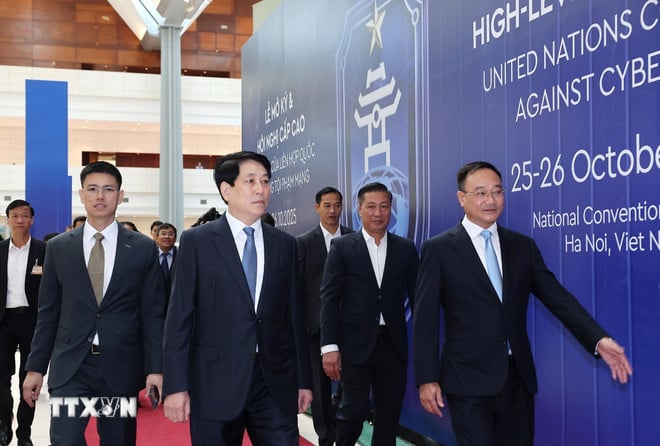
President Luong Cuong inspected the preparations and rehearsal for the signing ceremony of the United Nations Convention against Cybercrime (Hanoi Convention) at the National Convention Center (My Dinh, Hanoi). (Photo: VNA)
Vietnam's selection to host the signing ceremony of the Convention in October 2025 is not only a simple foreign affairs activity, but also an affirmation of Vietnam's position and responsibility in promoting global digital cooperation.
As a developing country facing many cyber security threats, Vietnam has proactively proposed and created a neutral and balanced dialogue space for countries to negotiate a common set of rules on cybercrime. The Vietnamese Government has paid special attention to preparations for the event, ensuring absolute security and safety, thereby demonstrating its sense of responsibility for this global issue. Vietnam's positivity and openness have been highly appreciated by the international community, as UN Deputy Secretary-General Ghada Waly expressed his appreciation for Vietnam's efforts and pledged to support countries in the process of ratifying and implementing the Convention.
The signing ceremony also included a high-level conference and thematic discussions, demonstrating the international community's determination to share responsibility and shape the future, which was also the official theme of the event. The fact that Hanoi was chosen as the place to sign the Convention, to the point that this document was also unofficially called the "Hanoi Convention," demonstrates Vietnam's prestige in creating peace and stability, as well as its increasingly active role in the international arena.
“Hanoi Convention” - a historic legal framework for cybersecurity
The United Nations Convention against Cybercrime is the first global criminal legal framework for cyberspace, adopted by the United Nations General Assembly on 24 December 2024.
This historic document was built through nearly 5 years of negotiations, including 9 chapters with 71 provisions, covering many aspects from crime identification to law enforcement cooperation.
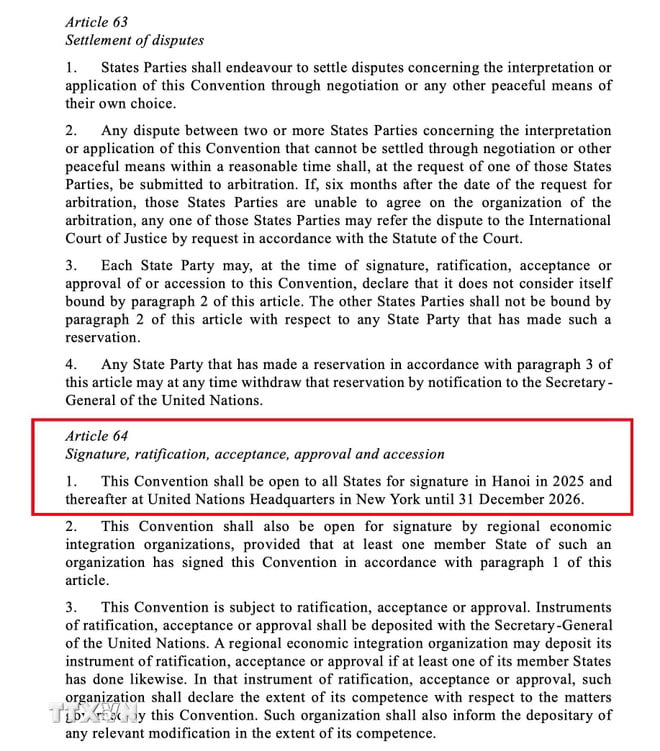
Article 64 of the Convention stipulates that the document will be opened for signature in Hanoi in 2025. (Photo: VNA)
Before this Convention, the world had almost no common “rules of the game” for the issue of cybercrime. The only previous international document was the Budapest Convention 2001 of the Council of Europe, which had only 66 non-European countries participating and faced the fact that major powers such as China, Russia, and India were not participating. Therefore, the birth of the United Nations Convention was considered a global turning point when for the first time the international community established a common legal framework to fight cybercrime on the widest scale.
The main contents of the Convention can be summarized as follows:
Criminalization of common cybercrimes: The Convention sets a common legal standard that requires countries to internalize a series of cybercrimes. The document clearly defines the most common crimes today such as illegal intrusion into the system, online fraud and scams, ransomware attacks, spreading malware, online child exploitation... These are all existing dangers that many countries have been confused about how to handle due to the lack of a common legal basis to crack down on.
Providing unified investigative powers in cyberspace: Each member state’s law enforcement agencies are equipped with a new set of investigative procedures and powers, applied consistently according to the Convention’s standards. For example, the Convention provides for measures such as the rapid preservation of electronic data (Article 25), partial disclosure of traffic-related data (Article 26), request for electronic data (Article 27), search and seizure of electronic data (Article 28), collection of real-time traffic data (Article 29), extraction of communication content data (Article 30), as well as freezing and confiscation of assets resulting from crimes (Article 31). These tools, if internalized, will help investigate cybercrime more quickly and effectively, overcoming the lack of a mechanism for handling that many countries are currently facing.
Establishing cross-border cooperation mechanisms: The Convention establishes a strong judicial cooperation framework to help countries overcome jurisdictional and border barriers in investigating and prosecuting cybercrime. For example, the exchange of electronic evidence or the extradition of criminals will be facilitated by a unified process recognized by all parties. This eliminates legal “grey areas” that transnational cybercriminals often exploit to evade responsibility.
Each State Party to the Convention must also be prepared to assist other States in investigating cybercrime involving foreign elements through extradition, mutual legal assistance and the freezing and confiscation of assets derived from crimes committed abroad. For many developing countries that do not have these measures in their national laws, the Convention will encourage them to improve their laws to meet common standards.
Ensuring a balance between human rights and privacy: In addition to strengthening the tools for tackling crime, the Convention also sets out limits on the protection of human rights and data privacy to prevent the risk of abuse. Important provisions such as Article 6 (respect for human rights), Article 21(4) (procedural fairness), Article 24(4) (limitations on data collection measures), Article 36 (protection of personal data) and Article 40(22) (non-discrimination in international legal cooperation) are designed to create a necessary balance with the above-mentioned powerful tools. This balance is especially important to reach consensus among countries, especially developing countries, to ensure that the goal of fighting cybercrime is not distorted into an excuse to violate personal freedom or to monitor citizens in an arbitrary manner.
The birth of the United Nations Convention against Cybercrime is considered a historic step forward in the fight to maintain security in the digital space. This document sends a strong call to action at the international level: it is time for all countries to come together to establish a common "rule of the game" so that no cybercriminal can be above the law.
Vietnam’s honor in hosting the signing ceremony of the Convention is a clear demonstration of its pioneering role, showing that we are ready to be the “architect” shaping the new global cyber security order. However, for the provisions on paper of the Convention to truly be effective, there needs to be joint action by all relevant parties after the signing ceremony.
Working together for a safe digital future
The digital world is at a critical turning point. The threat of cybercrime, with economic losses predicted to reach $17.9 trillion by 2030, has become an existential threat to the sustainable development of every country.
The fight against cybercrime, as analyzed above, is not the responsibility of any single person. To be successful, it requires the cooperation of all subjects: from political commitment at the national level through signing and ratifying international conventions, the responsibility of businesses in integrating security right from the product design stage, to the awareness of each individual in complying with information security rules. The spirit of “shared responsibility - shaping the future” is the key to building a safe digital future for all of us.
The signing ceremony of the United Nations Convention against Cybercrime in Hanoi will be a milestone for a new and hopeful journey. However, only when all parties join hands to act synchronously and decisively can we turn the provisions of the Convention into reality, successfully building a safe and sustainable digital future, for Vietnam in particular and the world in general. This is both a challenge and a noble mission that Vietnam, as a pioneer, is determined to carry out with the international community.
Continuing to write a new page in the history of global digital cooperation, Vietnam is showing that it is not only an active participant, but also an important factor in the journey of joining hands to protect peace and security in the digital age./.

References:
United Nations Convention against Cybercrime (2024); Ministry of Foreign Affairs & Ministry of Public Security of Vietnam (2025); Cybersecurity Ventures; World Economic Forum (2023); Lawfare (2025); FBI & CISA (2025); Council of Europe (2001).
(Vietnam+)
Source: https://www.vietnamplus.vn/buoc-ngoat-toan-cau-trong-cuoc-chien-chong-toi-pham-mang-va-vai-tro-tien-phong-cua-viet-nam-post1072322.vnp




![[Photo] President Luong Cuong chaired the welcoming ceremony and held talks with United Nations Secretary-General Antonio Guterres](https://vphoto.vietnam.vn/thumb/1200x675/vietnam/resource/IMAGE/2025/10/24/1761304699186_ndo_br_1-jpg.webp)
![[Photo] Prime Minister Pham Minh Chinh and South African President Matamela Cyril Ramaphosa attend the business forum](https://vphoto.vietnam.vn/thumb/1200x675/vietnam/resource/IMAGE/2025/10/24/1761302295638_dsc-0409-jpg.webp)
![[Photo] Solemn funeral of former Vice Chairman of the Council of Ministers Tran Phuong](https://vphoto.vietnam.vn/thumb/1200x675/vietnam/resource/IMAGE/2025/10/24/1761295093441_tang-le-tran-phuong-1998-4576-jpg.webp)

![[Photo] Prime Minister Pham Minh Chinh chairs conference on breakthrough solutions for social housing development](https://vphoto.vietnam.vn/thumb/1200x675/vietnam/resource/IMAGE/2025/10/24/1761294193033_dsc-0146-7834-jpg.webp)
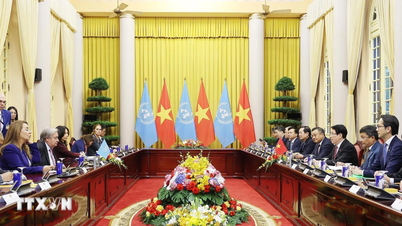
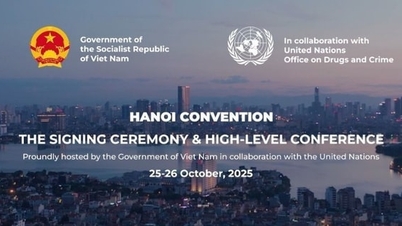

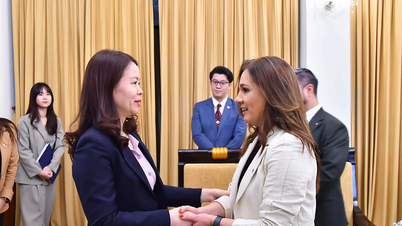



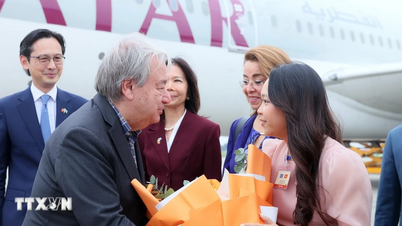
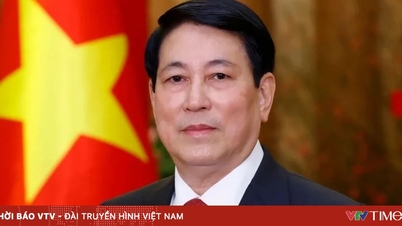

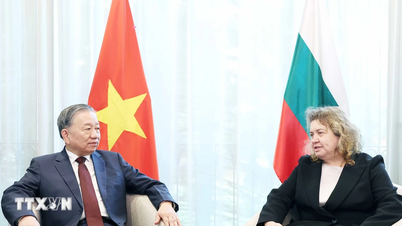
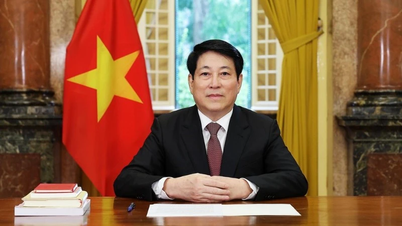

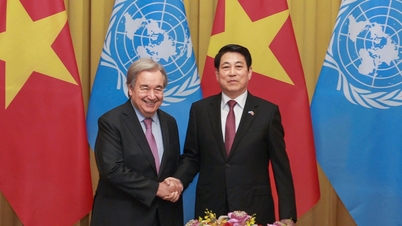

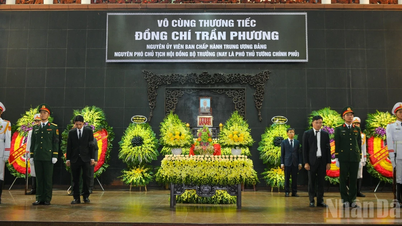
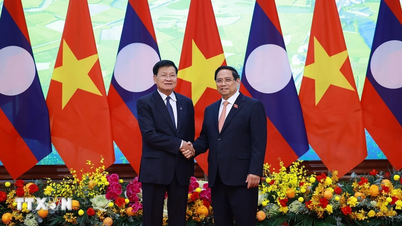






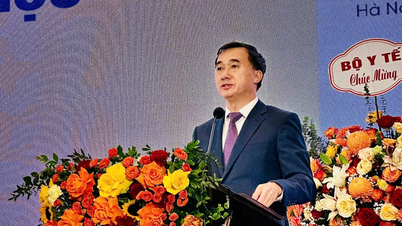






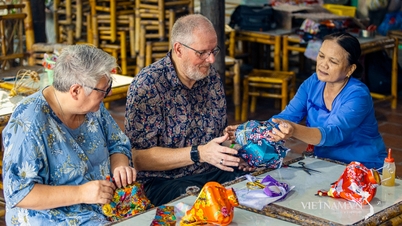
































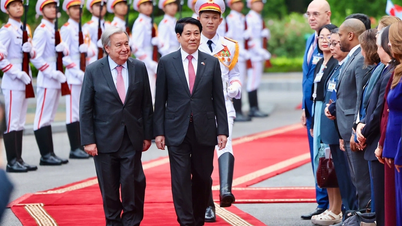

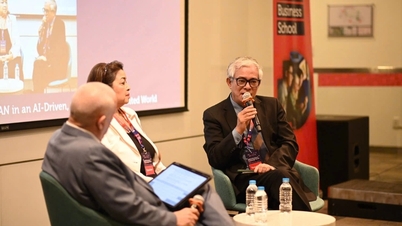

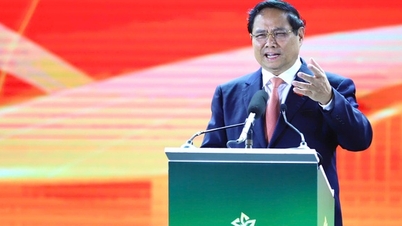

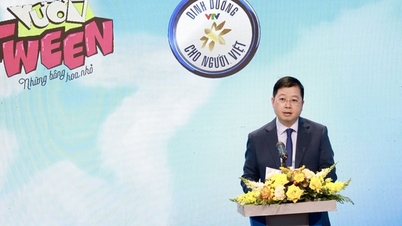

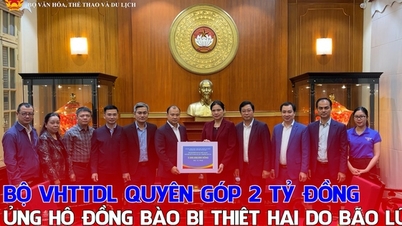


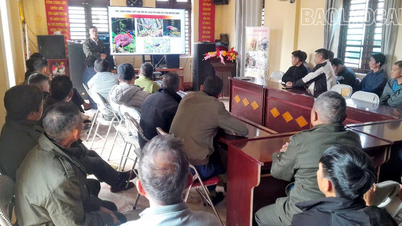





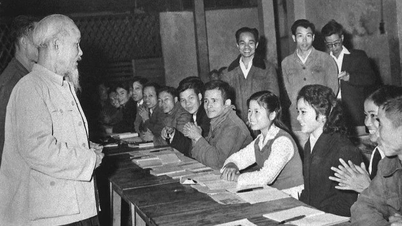

















Comment (0)